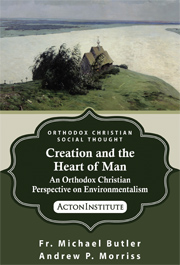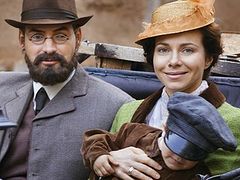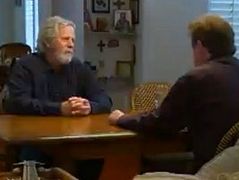SOURCE: ethikapolitika.org
Creation and the Heart of Man: An Orthodox Christian Perspective on Environmentalism by Fr. Michael Butler and Andrew P. Morriss (Acton Institute 2013).

Creation and the Heart of Man is the shortest and most politically focused of the welcome trifecta of new books on this topic, which also includes the richly comprehensive Toward an Ecology of Transfiguration: Orthodox Christian Perspectives on Environment, Nature, and Creation, edited by Fr. John Chryssavgis and Bruce V. Foltz, and the deeply scholarly The Noetics of Nature: Environmental Philosophy and the Holy Order of the Visible, a monograph by Bruce V. Foltz.
Chryssavgis is adviser to the Ecumencial Patriarch on environmental issues; Foltz is an eminent senior scholar in American environmental philosophy, a Heideggerean who converted to Orthodox Christianity. Their works are published by Fordham University Press.
Butler is a priest and independent scholar; Morriss is a law professor. Both also are Orthodox Christians. The inspiration for their monograph came from a conference of the libertarian Foundation for the Study of Free Markets and the Environment (FREE), and their monograph is published by the Acton Institute.
Creation and the Heart of Man has the virtues of conciseness and a clear, applied political-economic focus, both of which are its strength and weakness as a valuable part of this new cluster of publications. The book notes that, “While the creation of man and his fall and redemption in Christ are, and have always been, central concerns in Orthodoxy, the Orthodox Church has situated its consideration for these human issues within a larger horizon that embraces the whole of creation.” Its second chapter offers a valuable exploration of the Orthodox Christian teaching of the logoi as the divine meaning permeating creation. Its third chapter examines the role of human beings as both microcosm and macrocosm in nature, while the last chapter proceeds to discuss an ethos of living in nature from an Orthodox standpoint.
But in its introductory opening chapter, the authors clearly set forth their objection to what they see as a “deep left bias” in the increasingly growing library of literature on Orthodox Christian approaches to nature. Specifically, they bemoan the following: what they see as a lack of policy prescriptions drawn directly from Orthodox tradition; “the subordination of the Tradition to preexisting political or environmental agenda”; a tendency of such writings to be overly critical of Western society; and impractical policy recommendations. In this it criticizes some of the environmental statements of Patriarch Bartholomew, as well as of the post-communist Russian Orthodox Synod, but runs the risk of falling into its own critique.
Its emphases and discussion tend toward a particular kind of American conservative perspective, with an emphasis on free markets, rather than a more paleo-conservative concern about modernity along neo-agrarian lines, or the American Enterprise Institute’s Roger Scruton’s Green Philosophy with its “Red Tory” approach. More esoteric but creative approaches—such as geo-libertarianism and anarcho-monarchism—also aren’t considered, although the monograph does in a needed way open discussion further on alternatives to statist approaches and details how the latter work against the kind of spiritual transfiguration required in Orthodox cosmic theology.
Indeed, in the end the work is Orthodox and not libertarian, excellent in its rich outline of both patristic writings and a variety of contemporary scholars as well as the writings and lives of holy saints and elders (across a spectrum of approaches and views). For example, the authors do also positively address ideas of the Ecumenical Patriarch and the Russian Synod, in a tradition that relies not on papal leadership but on conciliarity.
Its effort to apply theology developed across centuries in situations far removed from modern America to our environmental problems today is thoughtful, if not always comprehensive. The authors observe how “each person bears an individual responsibility for caring for all of creation, for God is present in all of it,” offering an analogy between caring for the earth as one would care for a church temple.
This principle focuses attention on us as individuals and our choices. It is as insufficient to delegate responsibility for the environment to the state as it is to leave it to the state to keep a church clean. Moreover, we must be wary of absolutist statements about our interaction with creation. Keeping a church clean does not imply that we cannot burn incense in it during services. Similarly, we have been given a creation capable of bearing some of our impacts.
There are drawbacks to its concise focus, however. On a practical level, the short monograph does not really address or critique climate change, an issue so central to current environmental discourse. On an intellectual level, it does not fully define nature as a key term in relation to other key terms such as environment, cosmos, and creation, a needed feat in translating and applying Greek, Syriac, and Slavic Orthodox texts and traditions to the modern West.
While drawing on patristic sources for identifying nature with the human as microcosm, the book also doesn’t fully explore the patristic sense of nature as a gift-relationship (and thus in a sense open to analogies with a gift economy rather than free-market models). Nor does it fully explore what C.S. Lewis described as the Christian sense of nature being in some sense symbolic of the divine. However, its discussion of technology admirably parallels J.R.R. Tolkien’s emphasis on man in nature as sub-creator, even if not sharing his critique of technology as ideology, as seen in the mix of secular consumerism and scientism forming a technocracy allied with statism today.
Such omissions in emphasis reflect more deeply perhaps the absence of sustained discussion of Orthodox traditions of hesychasm, monasticism, and aesthetics, and a resulting limitation of environmental approaches to practical rather than contemplative concerns in patristic models. The book’s partial dimissal of St. John Chrysotom’s view of the earth as a household (a point further developed in the twentieth century by Fr. Sergius Bulgakov’s economic writing), in terms of classifying Chrysostom’s view as limited by his Malthusian economics, seems special pleading. It draws on James Madison but not on Orthodox notions of kingship in terms of the tradition’s ideas of symphonia andsobornost.
Nevertheless, the monograph’s conciseness, clarity, and accessibility are commendable, especially in its explication of Orthodox teachings on the logoi(words of the Logos) in creation, and on the uncreated energies, which are key to Orthodox cosmic theology, as developed by St. Maximus the Confessor and others. The authors note, “It is important not to think of the logoi as things that exist in themselves and that are different from the divine Logos and from the creatures they cause and define. They are not. They are simply the immanence of the divine Wisdom, the Word of God, in created beings.”
The book offers a strong explication of man’s biblical role as not only steward, like a rancher or a farmer that needs both to husband and to use resources, but also as transfigurational priest. It provides a diligent, traditionally minded discussion overall, and adds needed political diversity in combination with other works, reminding us that Orthodox Christianity cannot be confined to any one political ideology.




"I'm afraid you are too kind. As the book got better as it progressed you seem to have forgotten just how bad and anti-Christian the premises set up in the first chapter are.
As you say, the presentation of the Orthodox ethos in the latter chapters is done fairly well and there is little to argue with. Their attempt to wed that ethos, though--and even to marshal it in defense of--Modernity is absurd. Only one can stand and they know it. The tone of the first chapter and its outright assertion that the teaching of the Fathers and the anthropology of the Church must fall in line behind the "advances" of modern economics and sociology leave little doubt as to which side they are ultimately loyal to. This volume is not to be recommended, especially to conservative-ish Americans who already have a bad case of the Libertarian croup."